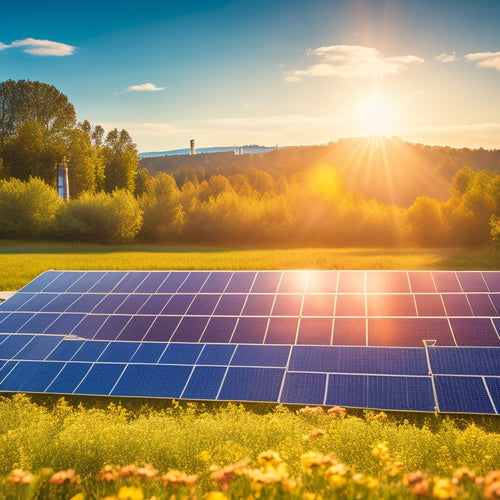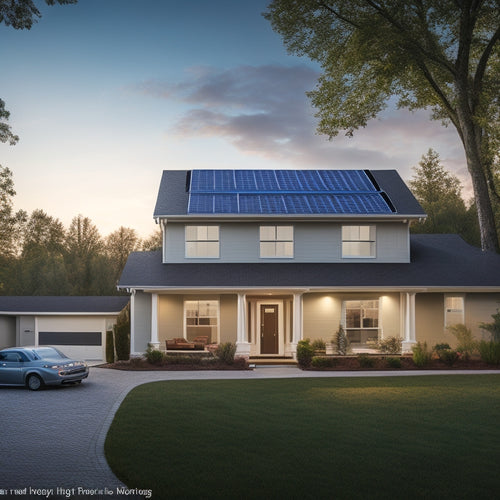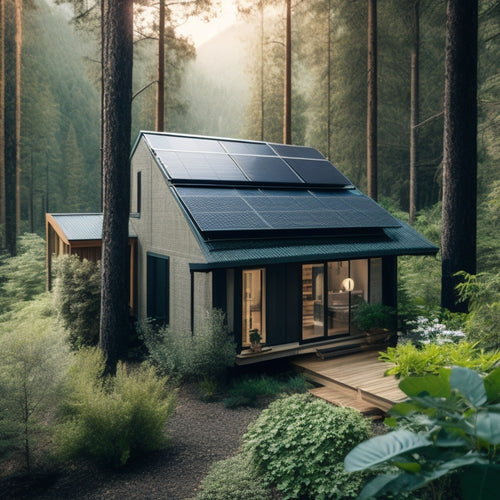
Cost to Install Solar Panels and Battery
Share
You can expect to spend between $15,000 and $30,000 or more to install a solar panel system with a battery, depending on the system size, quality, and features, as well as local labor costs and incentives. The upfront cost of solar panels and batteries is an investment in your property, increasing its value and appeal to environmentally conscious buyers. High-efficiency inverters and advanced power conversion technology guarantee ideal energy production and storage. Understanding your daily energy usage patterns is essential for system sizing and optimization. As you investigate solar energy solutions, you'll uncover the benefits of reducing your carbon footprint, increasing property value, and achieving energy independence - and that's just the beginning.
The Essentials
- Upfront costs of solar panels and batteries are decreasing, with tax credits and rebates helping to offset installation expenses.
- The average cost of solar panel installation ranges from $15,000 to $30,000, depending on system size and battery capacity.
- Battery costs vary widely, with prices ranging from $5,000 to $15,000 or more, depending on the type and capacity.
- High-efficiency inverters and advanced power conversion technology can increase the overall cost of the system but provide better performance and longevity.
- Understanding daily energy usage patterns and sizing the system correctly are crucial to determining the required battery capacity and overall cost.
Reduce Carbon Footprint Now
By installing solar panels, you're switching to a green energy source that greatly reduces your reliance on fossil fuels.
This change leads to lower emissions today, contributing to a cleaner environment and a decrease in your carbon footprint.
With the high upfront costs of purchasing and installing solar panels becoming more manageable, harnessing renewable energy is now a more accessible option for homeowners.
As innovations in the solar power market continue to make solar energy more efficient, you'll be reducing your impact on the planet and creating a more sustainable future.
As you generate your own clean energy, you'll be reducing your impact on the planet and creating a more sustainable future.
Green Energy Source
As you employ the power of solar energy, you're not only illuminating your home but also contributing to a cleaner environment.
This shift towards renewable energy is a significant step in reducing your carbon footprint. By tapping into the sun's energy, you're decreasing your reliance on fossil fuels, which are a significant contributor to greenhouse gas emissions.
With the growing demand for green home solutions, homeowners are now more than ever looking for ways to reduce their energy costs and carbon footprint.
Additionally, solar panels require minimal maintenance, making them a hassle-free option for homeowners.
With the cost of solar panels decreasing over the years, it's becoming a more affordable option for those seeking energy independence.
Lower Emissions Today
You're taking a considerable step towards reducing your carbon footprint by utilizing solar energy. By installing solar panels, you'll considerably lower your reliance on fossil fuels, which are a major contributor to greenhouse gas emissions. This not only benefits the environment but also provides you with a sense of independence from the grid.
Additionally, with Renewable Energy Solutions like solar battery systems, you can tackle three major concerns at once, including reducing your electricity bills and providing backup power during outages.
The environmental benefits of solar energy are undeniable. Solar panels produce clean, renewable energy, reducing your carbon footprint and contributing to a healthier planet.
Additionally, solar incentives, such as tax credits and rebates, can help offset the cost of installation, making it more accessible to homeowners.
Increases Property Value Fast
You'll be pleased to know that installing solar panels can greatly enhance your property's value.
In fact, studies have shown that solar panels can increase your property's selling price by up to $15,000, making your home more attractive to potential buyers.
With the rising demand for renewable resources and energy-efficient homes, solar panels can be a major selling point.
Additionally, solar panels can also increase your property's market appeal, setting it apart from other homes in the neighborhood.
Boosts Selling Price
Installing solar panels can increase your property's value by up to 17% on average, according to a study by the National Renewable Energy Laboratory. This significant enhancement in selling price can be a major selling point when you decide to put your property on the market.
The increased value is largely due to the financial incentives that come with solar panels, such as reduced energy bills and potential tax credits. Additionally, the installation costs of solar panels can be recouped through increased property value, making them a worthwhile investment.
As a homeowner, you can reap the benefits of solar panels even if you don't plan to stay in the property long-term. By installing solar panels, you're not only reducing your carbon footprint but also increasing the appeal of your property to potential buyers.
This can lead to a faster sale and a higher selling price. With the added value of solar panels, you can enjoy the freedom to make a profit on your investment and move on to your next venture.
Increases Market Appeal
Increases Market Appeal
On average, nearly 80% of homebuyers consider energy efficiency a high or very high priority when selecting a home, according to the National Association of Realtors. By installing solar panels and a battery, you can greatly increase your property's market appeal. This upgrade can be a major selling point, especially for environmentally conscious buyers.
| Feature | Benefit | Impact on Market Appeal |
|---|---|---|
| Renewable Energy Source | Reduces carbon footprint | High |
| Energy Independence | Lowers reliance on grid | High |
| Solar Incentives | Increases property value | Medium |
| Reduced Energy Bills | Saves homeowners money | Medium |
| Modern and Sustainable | Enhances property's modern appeal | Low |
High-Efficiency Inverter Technology Explained
You're likely familiar with the importance of inverters in solar panel systems, but what makes a high-efficiency inverter stand out?
When shopping for an inverter, you'll come across efficiency ratings, which represent the percentage of DC power converted to usable AC power.
With the rise of photovoltaic systems, homeowners are seeking high-performance solutions to maximize their energy savings.
Advanced power conversion technologies, such as maximum power point tracking, are key to achieving high-efficiency ratings.
Inverter Efficiency Ratings
When sizing up a solar panel system, inverter efficiency ratings are an important factor to take into account, as they greatly impact the overall performance of your setup.
You'll want to look for inverters with high efficiency ratings, typically above 95%, to guarantee maximum energy harvesting. There are different inverter types, including string inverters, microinverters, and power optimizers, each with its own efficiency characteristics.
Inverter lifespan is also vital, as it directly affects the overall system lifespan. A high-efficiency inverter can last up to 25 years or more, whereas a lower-efficiency model may need to be replaced after 10-15 years. This is important to take into account, as inverter replacement can be a significant cost.
When evaluating inverter efficiency ratings, look for certifications from reputable organizations like the California Energy Commission (CEC) or the International Electrotechnical Commission (IEC).
These certifications guarantee that the inverter meets certain standards for performance and reliability. By choosing an inverter with a high efficiency rating and a long lifespan, you can maximize your energy production and reduce your overall system costs.
Advanced Power Conversion
As you consider high-efficiency inverters, it's worth exploring the advanced power conversion technology that makes them possible. This technology is the backbone of modern solar technology advancements, enabling the efficient conversion of DC power from your solar panels to AC power for your home or business.
At the heart of this technology lies sophisticated power electronics, which guarantee maximum power point tracking (MPPT) and minimize energy losses.
Advanced power conversion enables high-efficiency inverters to achieve efficiencies of 98% or higher, markedly reducing energy waste and increasing overall system performance. This is particularly important when paired with energy storage innovations, such as batteries, which rely on efficient power conversion to maximize their storage capacity.
By leveraging advanced power conversion, you can access the full potential of your solar panel system, reducing your reliance on the grid and increasing your energy independence.
With the latest advancements in power conversion, you can trust that your solar panel system will operate at peak performance, providing you with clean, reliable energy for years to come.
Assess Your Energy Consumption
You need to understand your daily energy usage patterns to determine the right size of your solar panel system.
Start by identifying your energy consumption breakdown, including the appliances and devices that consume the most power. By doing so, you can reduce your carbon footprint and shift to renewable energy solutions that benefit the environment.
Additionally, analyzing your energy usage will help you identify areas where you can make adjustments to maximize energy cost savings.
Daily Energy Usage Patterns
Understanding your daily energy usage patterns is vital in determining the size of the solar panel system you need. You'll want to identify your peak energy consumption hours, as well as the days and months when you use the most energy. This information will help you choose a system that can meet your energy demands.
You can monitor your consumption using smart meters or energy monitoring devices that track your energy usage in real-time. These tools provide significant perspectives into your solar energy trends, helping you identify areas where you can reduce your energy consumption.
By analyzing your consumption patterns, you can optimize your energy usage and make the most of your solar panel system.
Consumption monitoring is essential in determining the correct size of your solar panel system. Oversizing or undersizing your system can lead to energy waste or inadequate power supply.
Energy Consumption Breakdown
Nearly 30% of your total energy consumption is likely attributed to just a few high-power appliances, such as your refrigerator, air conditioner, and electric oven.
These appliances are energy-intensive and can greatly impact your overall energy consumption. Understanding your energy consumption breakdown is essential in determining the size of the solar panel system you need to install.
To assess your energy consumption, you'll need to identify the energy efficiency of each appliance and their usage patterns.
For instance, if you have an old refrigerator with low energy efficiency, it may be consuming more energy than a newer, more efficient model.
Similarly, your consumption habits, such as leaving lights or electronics on for extended periods, can also impact your energy consumption.
By understanding your energy consumption breakdown, you can identify areas for improvement and optimize your energy usage.
This will help you determine the right size of the solar panel system and battery storage you need to achieve energy independence.
Lower Maintenance Than Generators
You'll appreciate that solar panels operate quietly, eliminating the noise pollution associated with generators.
This quiet operation is guaranteed, as solar panels have no moving parts, making them a more pleasant addition to your home or business.
With solar panels, you can enjoy the benefits of renewable energy without the constant humming or buzzing of traditional generators.
Quiet Operation Guaranteed
Most solar panels operate silently, producing no noise pollution whatsoever, which is a significant advantage over traditional generators that can be quite loud.
You'll appreciate the peace and quiet that comes with solar energy. Unlike generators, which can disrupt your daily life with their constant humming or buzzing, solar panels employ silent technology to capture energy from the sun.
This means you can enjoy the freedom to live life on your own terms, without the nuisance of noise pollution.
The noise reduction benefits of solar panels are particularly important for those who value their independence and desire to live off the grid.
With solar energy, you can say goodbye to the constant din of generators and hello to a more peaceful existence.
Plus, the silent operation of solar panels means you won't have to worry about disturbing the peace or violating noise ordinances.
You'll be free to live life as you see fit, without the constraints of noisy generators holding you back.
Frequently Asked Questions
Can Solar Panels Be Installed on a Metal or Clay Tile Roof?
You can install solar panels on a metal roof, as most metal roofs are compatible, but you'll need specialized mounting systems. With clay tile roofs, you'll need to take into account the added weight and potential damage to tiles during installation.
Are Solar Panels Covered by a Manufacturer's Warranty?
As you utilize the sun's energy, you'll want to know that your solar panels are protected by a manufacturer's warranty, ensuring peace of mind and safeguarding your investment in renewable energy, with warranty coverage typically lasting 25 years or more, mirroring solar panel longevity.
Do Solar Panels Work During a Power Outage?
You'll want to know that solar panels don't automatically provide power during an outage, but with a battery backup system, you'll have solar power reliability and outage preparedness, ensuring your freedom from grid dependence when you need it most.
Can I Install Solar Panels Myself to Save Money?
As you envision utilizing the sun's energy, you wonder if DIY installation can slash costs. While possible, it's essential to weigh the risks: improper installation can void warranties, compromise system efficiency, and even pose safety hazards, ultimately offsetting potential cost savings.
Are There Any Local or State Incentives for Solar Panels?
You'll find local and state incentives for solar panels, such as property tax exemptions and rebates, in addition to federal tax credits, which can greatly reduce your upfront cost, especially through renewable energy programs that promote a cleaner, freer future.
Final Thoughts
You've made it to the end of our guide to installing solar panels and batteries! By now, you know the benefits of reducing your carbon footprint, increasing property value, and utilizing high-efficiency inverter technology. Evaluating your energy consumption and opting for low-maintenance solar power over generators is a smart move. Did you know that solar energy has grown 49% in the last decade, making it the fastest-growing source of energy globally? Join the renewable energy revolution and start tapping into the power of the sun today!
Related Posts
-

Advantages of Solar Generating Systems Over Traditional Energy
Solar generating systems provide several key advantages over traditional energy sources. You'll experience lower long...
-

Cost of Solar With Battery Backup
You're investing in a solar panel system with battery backup to guarantee reliable power during outages. The cost of ...
-

Off Grid Solar Batteries
As you shift to off-grid living, you'll rely on high-performance solar batteries to store excess energy generated by ...


